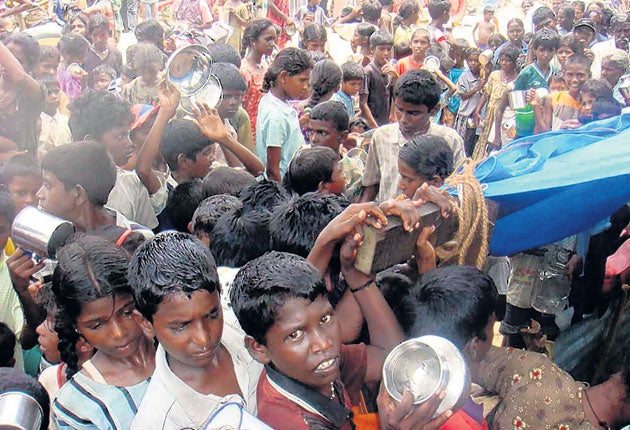UN effort to get safe passage for Sri Lankan children
Central government denies humanitarian crisis despite reports of malnutrition

A senior UN official has met leaders of the Sri Lankan government amid reports that food supplies for civilians trapped in the northern war zone are running short and that up to 4,500 people may have been killed in the past three months.
As photographs emerged from the so-called "no-fire zone" that show scenes of utter misery and hardship, a government health official in the region claimed that at least five children were dying every day from diarrhoea and malnutrition and that many mothers were too emaciated to nurse their babies. The government in Colombo has denied claims that people trapped there are suffering from malnutrition.
Vijay Nambiar, chief of staff of the UN secretary general Ban Ki-moon, met Sri Lanka's President Mahinda Rajapaksa yesterday, to discuss what many in the aid community say is an increasingly perilous situation for up to 150,000 trapped in the war zone.
"There are many severely emaciated people around the area," said the government health official in the war zone. He said that hundreds of nursing mothers whose breast milk has dried up because of malnutrition had in recent days come to a makeshift hospital to beg for baby formula. Because supplies were so low, he said, they were turned away.
A message sent by medical officials last night to The Independent read: "Many children have problems getting adequate and nutritional food. Severely malnourished children are coming to the hospital with various diseases."
The government strongly denied the allegations of malnutrition last night. S B Divaratne, the commissioner general of essential services, said: "This is completely untrue. Whoever is saying that the people in the no-fire zone are suffering malnutrition ... it's a complete fabrication. In March we sent 2,500 metric tonnes of vegetables and milk formula and this month we sent 1,300 tonnes of essential supplies of rice, dahl and oil. Another shipment was loaded today."
The government has also said that reports being sent by government health officials in the war zone – off limits to journalists and most aid workers – cannot be trusted as the area remains controlled by the Liberation Tigers of Tamil Eelam (LTTE). It has said the officials are being forced to make such statements, though the officials have denied this.
The plight of up to 150,000 civilians has become of increasing concern as the government seeks finally to crush the separatist LTTE guerrilla army and end a civil war that has raged for decades and which has cost the lives of a minimum of 70,000 people. A two-day ceasefire by the government came to an end on Wednesday as firing by both sides recommenced in an area that was supposedly designated a no-fire zone.
In what might be considered a criticism of the government's decision to resume its offensive, India yesterday called for a new ceasefire to let civilians escape the "evolving human tragedy". "Continuation of precipitate military actions leading to further civilian casualties at this time would be totally unacceptable," said the country's External Affairs Minister, Pranab Mukherjee.
Mr Mukherjee also became the latest to add his voice to those demanding that the LTTE allow the civilians to leave. International rights groups have accused the rebels of using the civilians as human shields. A number of civilians who have fled the region have said they were shot at by LTTE fighters. But, in an implicit admission that their military operation was drawing to a close, the LTTE promised in a statement on a pro-Tamil website that it would continue its fight by "political means" if the international community brokered a ceasefire.
Amnesty International has called for immediate shipments of aid to the region and also asked both the government and the rebels to declare a new truce. The UN refugee agency said in a statement that the living conditions of the displaced people has worsened with heavy rain and winds, and that most families are living under trees or damaged tarpaulin tents.
Join our commenting forum
Join thought-provoking conversations, follow other Independent readers and see their replies
Comments